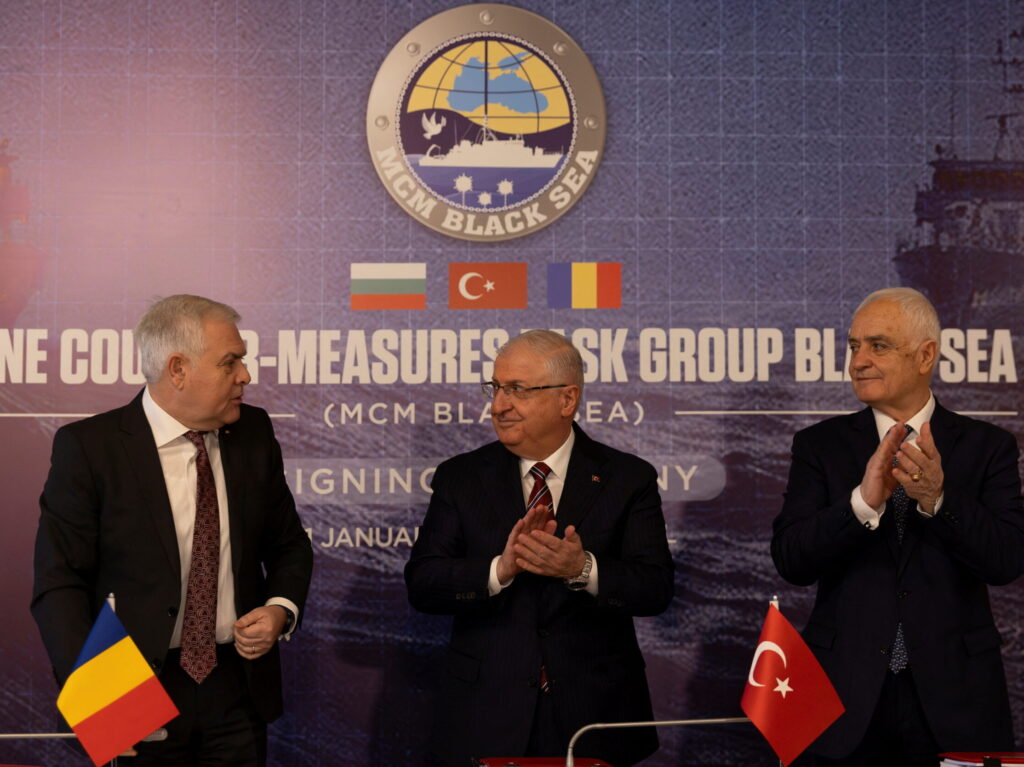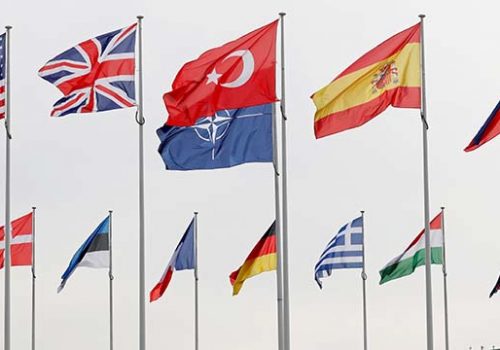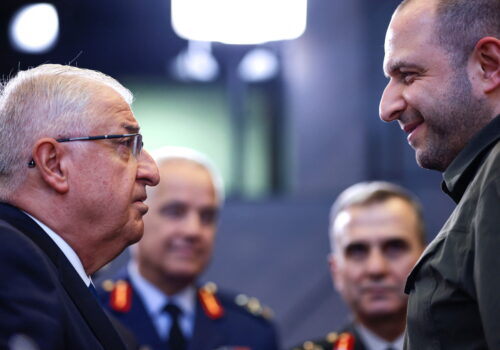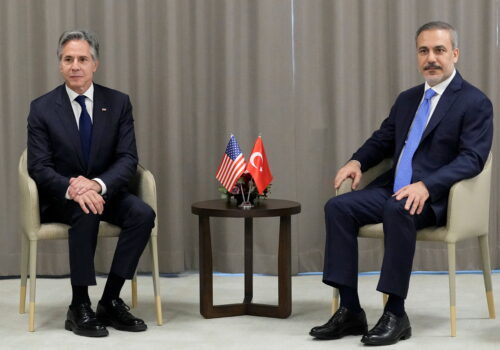This article has been adapted from the author’s chapter in an Atlantic Council report, “A sea of opportunities: Exploring cooperation between Turkey and the West in the Black Sea,” published in September.
In stark contrast to most other fronts in Russia’s war in Ukraine, the Black Sea has been relatively quiet.
That quiet, though, follows an incident on September 11, in which a Russian Tu-22M3 BACKFIRE bomber struck a Turkish-operated (and Saint Kitts and Nevis-flagged) merchant vessel, the Aya, with a Kh-22 missile within the Romanian exclusive economic zone.
Initially, it was not certain whether this attack would be the harbinger of a systematic Russian challenge to Ukraine’s new grain-export corridor, but Ukraine has been able to continue operating the temporary route. The quiet that followed suggests that the Kremlin is not ready for an escalation in and over the Black Sea. Subsequent intelligence assessments by the UK Ministry of Defence have linked the attack to a targeting error or miscalculation by Russian pilots rather than a deliberate effort to disrupt the maritime traffic in the corridor.
The Aya incident came in the wake of the activation of the Mine Countermeasures Black Sea Task Group (also known as MCM Black Sea) on July 1, stood up by three NATO members in the region: Bulgaria, Romania, and Turkey.
The task group represents a regional response to the growing threat of sea mines. It is aimed at ensuring the safe passage of ships in the Black Sea both in general and especially in the new grain-export corridor established by Ukraine after Russia’s withdrawal from the UN Black Sea Grain Initiative in July 2023.
Arguably, this task force represents a compromise position for littoral and nonlittoral stakeholders. First, its NATO aspect is much less pronounced than Bulgaria and Romania would have preferred, but more than Turkey would have welcomed in a perfect world. Ultimately, it is a task force assembled by NATO members outside the institutional framework of the Alliance to enhance maritime security in the Black Sea and maritime situational awareness of NATO in the region.
In many ways, the MCM Black Sea stands as the latest manifestation of Turkey’s long-standing regional ownership idea. Indeed, it may even be considered a scaled-down version of the BLACKSEAFOR, tailored to NATO purposes.
The security dynamics in the region have been susceptible to changes in the international order since the end of the Cold War. The region has always been a major security consideration for both Turkey and Russia, particularly in the context of managing their regional competition. Their competition management practices have resulted in a convergence of Turkish and Russian views on the undesirability of nonlittoral states’ involvement in the region. Furthermore, Russia’s exclusion from, and Turkey’s marginalization in, the rules-based international order has acted as a catalyst for bringing these two major players in the Black Sea closer.
The Russo-Georgian War of August 2008 brought about de facto changes in the territorial and maritime status quo in the Black Sea. South Ossetia and Abkhazia declared their independence with Russian support. The Abkhazian declaration of independence created the potential for great impact on regional geopolitics, considering it gave rise to an unrecognized state with access to the Black Sea.
The Turkish idea of regional ownership and its mechanisms received a substantial blow but nevertheless survived the war, partly because the Obama administration in the United States had not yet dismissed the idea of accommodating Russia in the liberal international order. The strategic choices of the global leader largely determined the parameters of interaction regionally.
The 2014 Russian annexation of Crimea was the final nail in the coffin for the regional security architecture championed by Turkey. With this annexation, Moscow was able to build a formidable anti-access/area-denial sphere covering the entire Black Sea. Russia then began to voice stronger opposition to the naval presence of nonlittoral states in the Black Sea. Moreover, Moscow accelerated its naval reconstruction program for the Black Sea fleet with the addition of six new submarines, six frigates, and four new corvettes armed with cruise missiles by 2020. In short, Russian revisionism rendered Turkey’s status quo policy in the Black Sea unsustainable and untenable.
Russia could have comfortably claimed mastery of the Black Sea when it unleashed its attack on Ukraine in February 2022. It had a formidable array of combat and auxiliary vessels supported by an impressive naval air power stationed in Crimea. This mastery, however, would not even last past the first year of the war. In March 2022, Turkey closed the straits to the warships of belligerents at the request of the Ukrainian government. Turkey’s decision, in effect, turned the Black Sea into the maritime equivalent of a boxing ring, denying belligerents the opportunity to reinforce their existing fleets with units from other theaters and countries.
Since then, the Russian Black Sea fleet has suffered huge losses including a guided missile cruiser, several amphibious assault ships, and an improved Kilo-class diesel submarine. So long as the war goes on, Russia will be unable to replace its losses, increasingly a hostage to the Black Sea than its paramount. The Kremlin has had to withdraw its naval and air assets to the east to avoid further losses to Ukrainian standoff anti-ship and air-to-ground missiles. The situation in the Black Sea reflects the overall change in the character of war from maneuver to attrition. In the meantime, as the Russian Navy is worn down, others seek to increase their naval strengths. By the time the war ends, Russia may face a radically altered and very unfavorable naval balance of power in the Black Sea.
Russia has lost sea control in the western Black Sea. Its naval blockade of Ukraine’s remaining coastline did not survive the first year of the war. The sinking of the cruiser Moskva, the flagship of the Russian Black Sea fleet, indeed symbolized the demise of the Russia blockade. Ever since, Ukraine has maintained somewhat secure access to the Black Sea, on which its future as a sovereign and independent state hinges. The western Black Sea is now effectively denied to the Russian Navy’s surface vessels. Moreover, Ukrainian attacks on command and control centers, anti-access/area-denial assets, and shipyards have substantially degraded Russia’s ability to sustain its maritime power in the Black Sea—now a wholly contested maritime theater of operations for both belligerents.
Considering that Russian effectiveness in the Black Sea has gone down to a tolerable level, NATO’s direct maritime presence is no longer considered essential. However, the US and British air control over the western Black Sea facilitates Turkish primacy in the Black Sea, ensuring that they will remain the most relevant nonlittoral actors in Black Sea security for the foreseeable future.
There are indications that the European Union (EU) may be contemplating a Black Sea strategy without regard to Turkey and its concerns. Romania and Bulgaria may be tempted to bring the EU in, as a counterbalance to Turkey’s influence as the primary maritime security provider to the region and as the strongest NATO member in the Black Sea. Persistence of the EU’s exclusionary practices may be self-defeating and drive Turkey and the EU further apart as two competing maritime security providers in the Black Sea.
The Russian invasion of Ukraine has upended understandings of European security and its institutions. The course of events first suggests that NATO, once considered by some as brain dead, remains the core institution of the European security architecture to tackle revisionist Russia’s military threat. Second, both of NATO’s two original functions—keeping the United States in Europe and keeping Russia out—have been revived. With Donald Trump’s re-election as US president, the former has become as challenging as the latter.
At this point, a crucial question is how to keep Turkey in NATO so that it is an asset rather than a liability for European security. There are two possibilities: the current war will either play a catalyst role in bringing Turkey back into the fold of mainstream European politics or will add momentum to its alienation from the West in general.
Serhat Güvenç is a professor of international relations and the dean of the College of Economics, Administrative Sciences at Kadir Has University. Previously, he held faculty positions Istanbul Bilgi University (from 2000 to 2010) and lectured as visiting assistant professor of history at the University of Chicago (2006). He also lectured as adjunct professor of international relations at Koç University (2008 and 2009) and Bosphorus University (2014). Follow him on X @SerhatGuvenc.
This blog is part of a joint research project of the Atlantic Council Turkey Program and the Centre for Applied Turkey Studies entitled “A Sea of Opportunities: Can the West Benefit from Turkey’s Autonomous Foreign Policy in the Black Sea?” The research provides a lens into Turkey’s aspirations for regional leadership and identifies possible avenues of collaboration between Ankara and its Western allies in the Black Sea region in several areas, such as defense and military cooperation, political and diplomatic dialogue, and maritime and energy security.
Further reading
Wed, Oct 16, 2024
Turkey and the West’s Black Sea interests converge more often than is acknowledged—opening up opportunities for cooperation
TURKEYSource By
Turkey and the West have clear opportunities for more effective cooperation in the Black Sea, but both sides need to show will.
Wed, Aug 28, 2024
Turkey wants to end the war in Ukraine—and might have a formula to do it
TURKEYSource By Rich Outzen
Turkey would play a role in a cease-fire and post-war arrangement, drawing on a history of balance and deterrence in the Black Sea region.
Fri, Jul 5, 2024
Why Washington must take the opportunity of the NATO Summit to reengage with Turkey
TURKEYSource By Yevgeniya Gaber
Strengthening relations between the US and Turkey will be critical for the future of the Alliance's regional defense strategies.
Image: Turkish Defence Minister Yasar Guler, his Romanian counterpart Angel Tilvar and Bulgaria's Deputy Defence Minister Atanas Zapryanov attend a signing ceremony of a memorandum of understanding on establishing a mine countermeasures naval group in the Black Sea, aimed at clearing mines floating there as a result of the war in Ukraine, in Istanbul, Turkey, January 11, 2024. REUTERS/Umit Bektas



